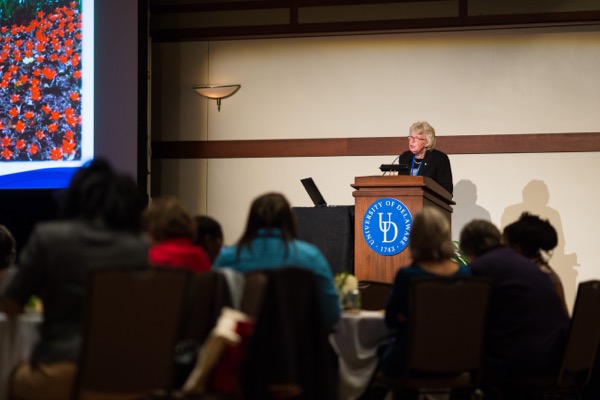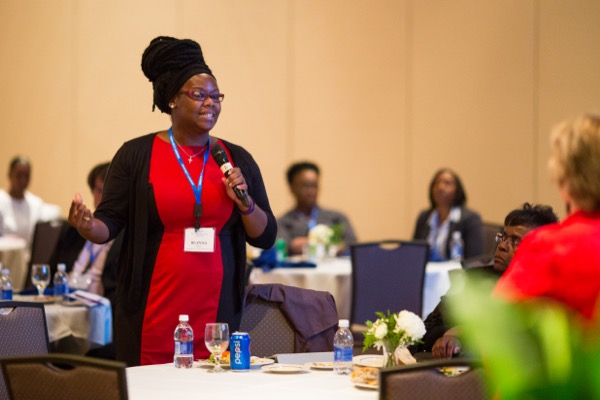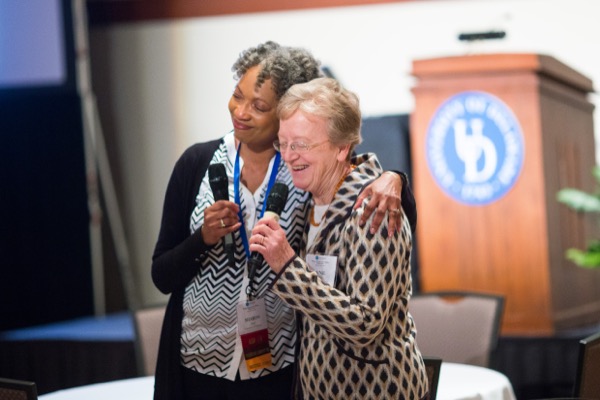


A call to 'Color the Academy'
National conference explores how to advance academic women of color
Editor's note: For full conference coverage, also see "Stories Behind the Statistics" and "Toward greater diversity and excellence."
6:14 p.m., May 6, 2016--With examples ripped from real life and participants providing as much commentary and insight as the expert panelists, the University of Delaware's national ADVANCE conference provided a sound platform for edgy-but-hopeful discussions about race and gender in higher education.
More than 175 people from 50 institutions in 20 states converged on UD's Clayton Hall from April 29-May 1 for the three-day event -- called "Women of Color in the Academy: What's Next?" -- hosted by the University's ADVANCE Institute. The ADVANCE program is part of a National Science Foundation initiative to promote diversity in higher education, especially in the STEM fields -- science, technology, engineering and mathematics -- where women, and especially women of color, have been few in number.
Campus Stories
From graduates, faculty
Doctoral hooding
Finding effective ways to address that deficit is more than a nice idea. Building diversity can produce more innovative, transformative work, stimulate new solutions and expand the opportunities for future generations of thinkers.
"When we are in diverse groups, we think more creatively," said Denise Sekaquaptewa, a professor and psychologist from the University of Michigan.
Sekaquaptewa, whose ancestry includes the Navajo and Hopi tribes, is among a select group, indeed. Less than 1 percent of tenure-track professors are Native American, she said.
Women and racial minorities struggle against multiple obstacles, she said -- internal and external. Studies show that stereoptypes, lack of peers and a "chilly" environment affect performance for both, she said. Even relatively small disadvantages when they accumulate over the years can have significant effects.
"Equal rank is not the same as equal status," she said.
A continuing challenge
Diversity at all levels is a continuing challenge for higher education. The weekend conference gave voice to those who study these dynamics and those who live them.
"Women of color need to understand the realities of the situation in an academic way," said Sharon Neal, associate professor of chemistry at UD and co-chair of the program. "That helps us advocate for ourselves. It's not fair, but people are harder than science -- and science is damn hard. Some think if we just work hard and do science, things will work themselves out. But we need to get the message out that you are up to this job, but you need to be responsible for both sides of this job.
"“This is one of many frontiers in today’s civil rights movement,” she said.
Throughout the weekend, participants heard from leaders, faculty members, students and researchers, all adding their perspectives to a trove of experience, data and recommendations.
They heard about the importance of using humor in communication, maintaining a sense of optimism, and managing -- not suppressing -- emotions.
One powerful truth, Neal said, is that "it is not the job of marginalized faculty to set right the policy of the university. They need our voice, yes, but it is not our job to make up for the lack of presence."
Sakaquaptewa said universities must take a hard look at the messages they send on their websites. Are all of the photographs of white men? Are the contributions of women and racial minorities integrated into the whole?
"It's not just a benefit to one group," she said, "It's benefits everybody in that environment."
It is a challenging task, to be sure, said Margaret Andersen, a professor and sociologist who has held many leadership positions at UD. She used a maritime metaphor to make her point.
"Gigantic tankers can take three miles to stop," she said. "We want to change institutions with the grace and beauty of a sailboat, when often what we're dealing with is a tanker."
Among the themes she traced during the weekend were:
* The need to measure "invisible work"
* The importance of sharing institutional priorities
* The recognition that racism and sexism is systemic, not just individual
* The need to change promotion standards and address "tenure creep," the ever-increasing list of expectations and criteria for promotion and tenure that is happening just as women and women of color are emerging in greater numbers
* The need to remember the value of life outside the university
* The importance of "self-care"
Andersen made reference to the concept of the "greedy institution" that makes all-inclusive claims and demands undivided loyalty for the privilege of being an insider.
"There is evidence that doctoral students feel the greedy institution is not going to accommodate their lives," she said. "... Institutions that are willing to change stand to gain the most."
Navigating injustices that for some occur on a daily basis requires resilience and support, she said.
"You need a trusted companion who can help you decide when is the time to fight."
Making stronger networks
Connections were made over the weekend that may contribute to stronger networks in the future.
Taneisha Gillyard, in the third year of doctoral work at Meharry Medical College in Nashville, Tennessee, said the time was helpful to her as she makes plans for the future. She hopes to open a holistic health center and stay in the South, investing her gifts in an under-served community.
"As I am nearing the end of my Ph.D. training, I'm thinking about my next steps," she said. "I am interested in teaching but I'm not sure what environment that will be. To hear the experiences of women of color in academia is helpful."
Gillyard, who is studying neuroscience and pharmacology, was especially glad to hear from a panel of faculty in the sciences Sunday morning -- Dawn Lott, professor of mathematics at Delaware State University, Cherese Winstead, chair of the chemistry department at DelState, and Andrea Lobo, professor of computer science at Rowan University.
Winstead, the daughter of sharecroppers, said discouragement comes from all angles. When she was working on her master's degree, one adviser -- an African-American male -- told her he didn't know why she was there.
"You'll get pregnant and drop out," he said.
He was wrong, but he taught her something about being an adviser.
"Because of my lack of mentoring, it motivated me to give them [her students] everything I didn't get," she said. "I want to make it a better experience for someone else."
One of her students, though, told her she wasn't sure she wanted to turn out like her, facing so many taxing situations.
"You can have a family and be in science," Winstead said. "You can have all of it."
Winstead, the first in her family to get a bachelor's degree, master's degree and doctorate, went into industry after earning her doctorate and supervised six male Ph.D.s.
"If anyone has ever supervised male Ph.D.s in industry, you know it prepares you for children, the Nobel Peace Prize -- anything," she said. "There is nothing I cannot try to solve now."
Winstead said the number of women entering research is on the rise.
"But I'm not seeing women achieve senior level status," she said.
The University of Delaware's Acting President Nancy Targett, a marine biologist, would be a clear exception, and she spoke to the group Sunday, opening her talk with a photograph of a stand of tulips at Longwood Gardens.
In the middle of a large cluster of red tulips was one yellow tulip.
"We all have things that make us different," Targett said, "and we need to celebrate those differences."
Self-awareness and situational awareness are important.
"All of us are called to be leaders," she said, "but not all of us are going to lead in the same way. Some will lead in the classroom, some in research, some in communities and in families, some in all of the above."
Targett urged participants to develop their narratives.
"That helps to inspire others," she said.
And she recommended embracing mentors from multiple generations and all stripes of people.
"Don't rely on just one person to be your support network," she said. "Some of my students have been mentors to me."
Sharing life stories is a focus for Jeannette Brown, a retired research chemist from Hillsborough, New Jersey, who applauded the achievements she was hearing about and spent some of her time at the conference collecting oral histories for an upcoming book.
"People were willing to share honestly," Neal said. "It was a safe space and we set a tone.... It has been the highlight of my life as a scientist at Delaware."
Anne Boylan, recently retired UD history professor who co-chaired the program with Neal, said there is much more to come.
"We have heard practical strategies than can be applied anywhere," she said. "We will do follow-up."
Many participants requested ways to stay in touch with each other, and there were many embraces as the event drew to a close.
"I'm very glad that I came," said graduate student Kishana Taylor, who is studying virology at the University of Georgia, as she brushed away tears. "Now I have to go home."
Gillyard, who said she had no positive role models until she was halfway through her undergraduate studies, said she came away from the conference with prospective mentors and much to think about.
"Both culturally and academically I see that change is possible -- and on the horizon," she said. "I'm hoping it comes in my lifetime."
About the Women of Color in the Academy conference
Focusing on faculty women of color, especially in STEM fields, this research conference provided opportunities for participants to discuss and learn about cutting-edge research on the recruitment, retention, advancement and leadership of faculty women of color, while highlighting their lived experiences. Over 175 faculty, administrators, students, and government and industry representatives from more than 50 institutions in 20 states attended the conference.
The UD ADVANCE Institute plans to post the keynote addresses on its website, and the documentary, Living Thinkers, is available in the University of Delaware Library for viewing.
Support for the conference came from the UD ADVANCE Institute, the Office of the President, the Office of the Provost, the Vice Provost for Diversity, and the Department of Philosophy’s Class of 1955 Fund.
About UD ADVANCE
The ADVANCE Institute is a National Science Foundation ADVANCE-IT funded program that focuses on institutional transformation and is designed to enhance the representation and advancement of women faculty in STEM fields and women faculty of color in all fields. The program will ensure an inclusive campus culture by bringing awareness at all levels—from the upper administration to the faculty—of the impact of unconscious bias in recruitment, hiring and advancement practices. It will thereby create a more equitable path forward for all faculty and lead to a climate that ensures success for women faculty of all fields.
Article by Beth Miller
Photos by Kevin Quinlan










